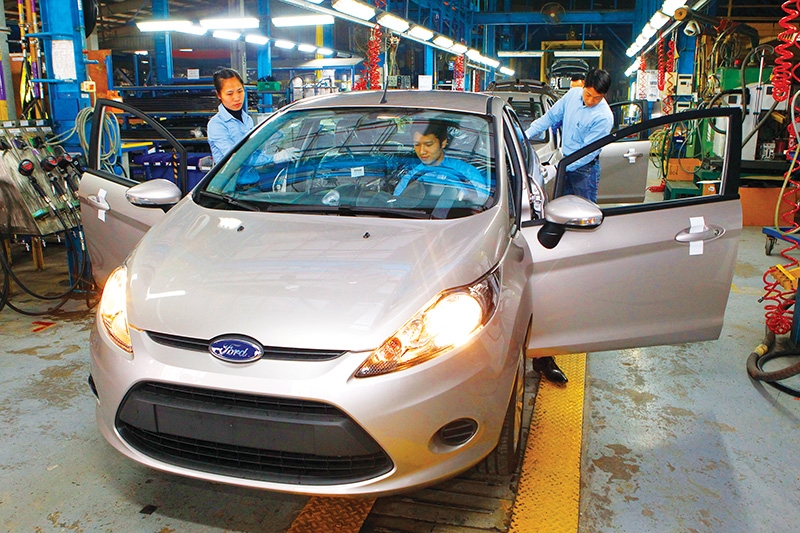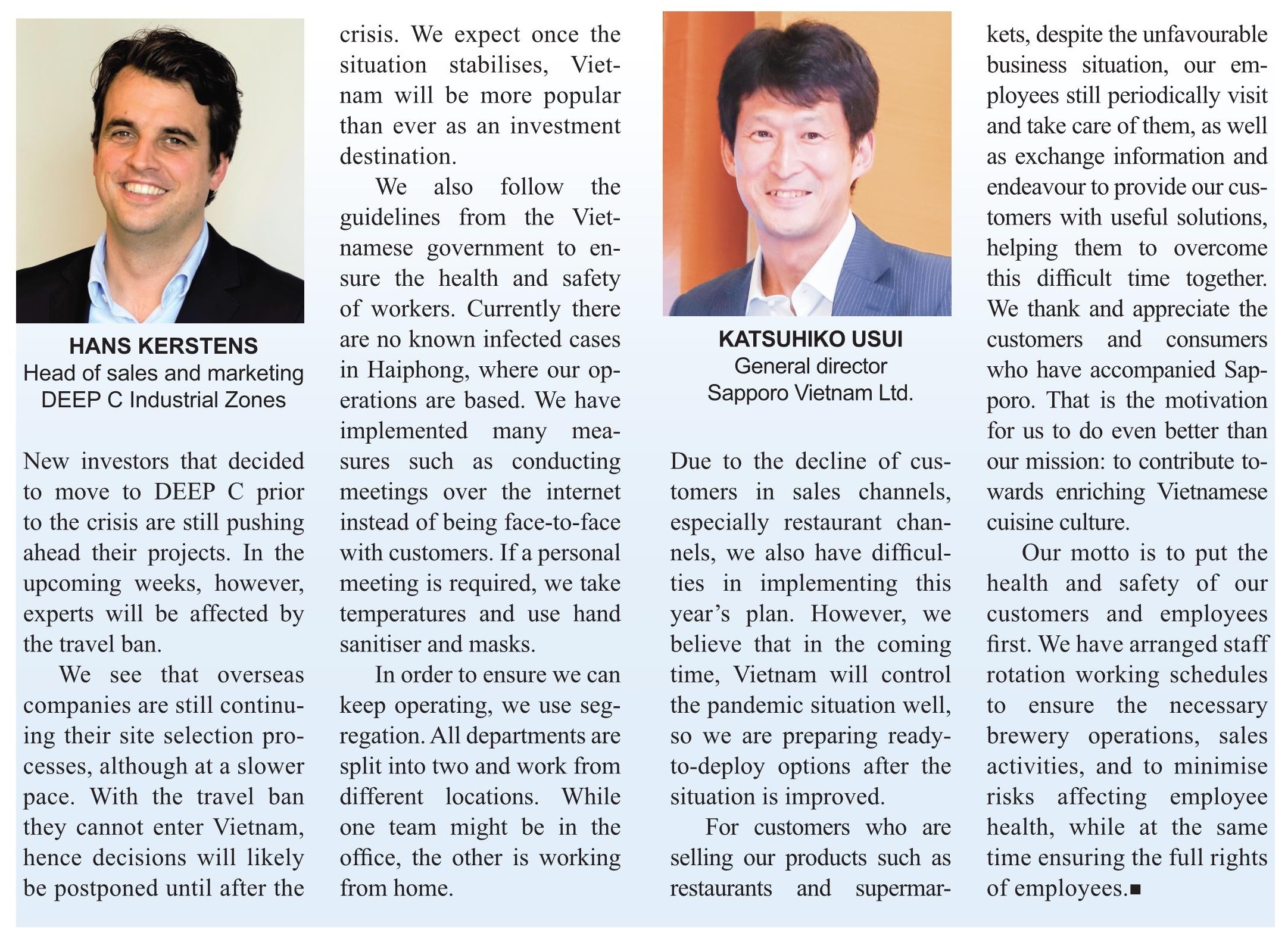Human safety the top priority as groups submit to guidelines
 |
| Along with other businesses, Ford Vietnam is implementing measures to protect heath and safety of workers and others |
Following Ford and Toyota announcements to shut down plants in Asia, some manufacturers made scenarios to temporarily close worldwide in order to cope with the spreading coronavirus outbreak.
“The health and safety of our employees, dealers, customers, partners, and communities is our highest priority,” Mark Ovenden, president of Ford’s International Markets Group, said in press release last week.
Ford CEO Jim Hackett also notified employees that “tougher actions” such as job cuts could be needed depending on the severity and length of the coronavirus pandemic.
Ford’s facility in Vietnam ceased operations starting from March 26 and became the first automaker in Vietnam to do so. Meanwhile, Japanese Panasonic decided to temporarily close the factory in Panasonic Appliances Vietnam in Hanoi’s Thang Long Industrial Park 1 on March 19 in order to protect labourers, after two workers were found under suspicion of infection.
Japanese bathroom product manufacturer TOTO has temporarily closed its office and showroom in Ho Chi Minh City after the company’s staff came into contact with a patient infected with the disease.
“Japanese companies understand that it is the most important to stop the spread and to keep the infection under control within the capacity of existing medical facilities. So we support all measures currently implemented by the Vietnamese government. We understand how difficult it is to decide on many urgent yet sensitive issues in a very rapidly changing environment,” said Shinji Hirai, chief representative of the Japan External Trade Organization’s Ho Chi Minh City office.
Prime Minister Nguyen Xuan Phuc called this a “golden time” to contain the spread of the coronavirus in Vietnam, while enforcing stricter measures as well as stressing safety first amid the rapid increase of new infection cases over the past three weeks.
Under the prime minister’s newly-signed direction, operations of service trading facilities, except for those selling essential goods and services shall be closed from March 28 to April 15 and religious rituals and activities of over 20 people and all gatherings outside offices, schools, and hospitals shall be temporarily suspended until April 15.
Under a survey from the American Chamber of Commerce in Vietnam to measure the business impact in Vietnam in the wake of the outbreak, members are proactively taking measures to protect their staff and workplaces. Over 90 per cent of responders said they have made changes, including educating employees on good hygiene, including frequent handwashing and avoiding touching of the face; providing hand disinfectant in the workplace (88 per cent); more cleaning of surfaces (70 per cent); and providing links for public information updates from the World Health Organization, and/or the Ministry of Health. Other measures included encouraging or requiring masks and temperature checks at the workplace, among others.
Guido van Rooy, executive director of the Dutch Business Association Vietnam stressed, “The crisis is affecting each and every one of us. It is useful for all companies to better understand what others are doing to solve these problems, and by sharing potential support and providing each another with tools or methods to mitigate the losses or simply survive.”
The association has hosted many online conferences for its members including top firms such as Signify, DeHeus, HEINEKEN Vietnam, Royal Haskoning, and FrieslandCampina in order to update and share experiences to cope with the crisis. Rooy said the association is managing to keep their employees on board during this difficult time in order to excel when the economic tide turns.
“All participants agreed that the crisis will be over one day and they all want to come back stronger than before. By bluntly cutting costs, companies will have a hard time to get back on their feet again once the crisis passes, and that is why most companies are focusing on cost control,” he said.
The business community agreed that they should follow guidelines provided by leading global and local health authorities, while global corporations should identify input-variable triggers that could drive significant liquidity events and identify actions to stabilise the organisation in each scenario. In the same battle, Laurent Levan, president and general director of URC Vietnam said, “At URC Vietnam, our management team has been closely monitoring the impact across our business operations from the beginning of the pandemic and our Business Continuity Plan has been immediately activated for appropriate responses as well as other appropriate measures to guarantee the best continuity of operation and ensure the good health of our employees, our partners and local community.”
“From the continuity for our supply chain to the price stability of our products, from flexible work arrangements to split teams and rotation: these are examples how URC Vietnam as a responsible company is acting to mitigate business interruptions. Of course, URC Vietnam strictly follows all the guidance and direction from the government and local authorities. We are all mobilised to accompany the country’s efforts to fight this terrible pandemic,” he added.
ABB’s CEO Bjorn Rosengren also commented, “With many critical services and industries at risk of being overwhelmed or shut down, we all need to work together – governments, businesses and civil society – to keep our healthcare systems, power networks, and other essential services operational. The health and wellbeing of all of us – workers, families, society, and future generations – depend on it.”
 |
What the stars mean:
★ Poor ★ ★ Promising ★★★ Good ★★★★ Very good ★★★★★ Exceptional
Themes: COVID-19
- 67 million children missed out on vaccines because of Covid: UNICEF
- Vietnam records 305 COVID-19 cases on October 30
- 671 new COVID-19 cases recorded on October 1
- Vietnam logs additional 2,287 COVID-19 cases on Sept. 21
- People’s support decisive to vaccination coverage expansion: official
Related Contents
Latest News
More News
- VNPAY and NAPAS deepen cooperation on digital payments (February 11, 2026 | 18:21)
- Vietnam financial markets on the rise amid tailwinds (February 11, 2026 | 11:41)
- New tax incentives to benefit startups and SMEs (February 09, 2026 | 17:27)
- VIFC launches aviation finance hub to tap regional market growth (February 06, 2026 | 13:27)
- Vietnam records solid FDI performance in January (February 05, 2026 | 17:11)
- Manufacturing growth remains solid in early 2026 (February 02, 2026 | 15:28)
- EU and Vietnam elevate relations to a comprehensive strategic partnership (January 29, 2026 | 15:22)
- Vietnam to lead trade growth in ASEAN (January 29, 2026 | 15:08)
- Japanese business outlook in Vietnam turns more optimistic (January 28, 2026 | 09:54)
- Foreign leaders extend congratulations to Party General Secretary To Lam (January 25, 2026 | 10:01)

 Tag:
Tag:




















 Mobile Version
Mobile Version